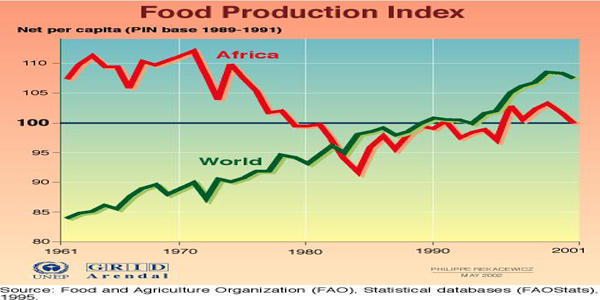- Washington “follows with interest” Morocco’s openness onto Africa (John Kerry)Posted 11 years ago
- The trial of South African Paralympic champion Oscar Pistorius opened in Pretoria on Monday.Posted 11 years ago
- USA welcomes efforts of King Mohammed VI in MaliPosted 11 years ago
- Egypt’s population reaches 94 millionPosted 11 years ago
- Mugabe celebrates his 90thPosted 11 years ago
- Moroccan Monarch to Build a Perinatal Clinic in BamakoPosted 11 years ago
- King Mohammed VI handed a donation of bovine semen for the benefit of Malian breeders.Posted 11 years ago
- Moroccan King’s strategic tour to Africa: Strengthening the will of pan African Solidarity and stimulating the south-south cooperation mechanisms over the continentPosted 12 years ago
- Senior al-Qaida leader killed in AlgeriaPosted 12 years ago
- Libya: The trial of former Prime Minister al-Baghdadi AliPosted 12 years ago
Africa/Food Security: reinvest in agriculture
 Agriculture is not only a vital source of food in Africa; it also is the prevailing way of life. An average of 70% of the population lives by farming, and 40% of all exports are earned from agricultural products – (World Resources Institute, 1996).
Agriculture is not only a vital source of food in Africa; it also is the prevailing way of life. An average of 70% of the population lives by farming, and 40% of all exports are earned from agricultural products – (World Resources Institute, 1996).
African states are urged to support farmers. This is the suggestion lunched, at the FAO headquarters in Rome, at the opening of World Food Day by the President of Rwanda, Paul Kagamé.
He has invited his peers in the third world to massively reinvest in agriculture, particularly to support small farmers whose role will be crucial in solving the problem of hunger that affects nearly one billion people worldwide. Over the past 30 years, public investment in agriculture has declined drastically because we mistakenly believed that the private sector will take over. We must reverse this approach. It is unacceptable that despite the scientific and technological advances in agricultural, we are still talking about countless people who continue to die of hunger and related diseases”.
The General Director of the FAO, Jacques Diouf, said that the current dramatic situation occurred because and instead of addressing the structural causes of food insecurity, the international community has neglected agriculture in the policies of development, which resulted in developing countries, by the decline in investment in this sector. The share of agriculture in development assistance fell dizzy during the last thirty years: from 19% in 1980, it dropped to 3% in 2006, reaching around 6% currently. Reversing this trend is even more urgent as the population grows rapidly. We have to increase food production by 70% worldwide and double that in developing countries to ensure food security and meet the challenge of feeding the world population, expected to reach 9.1 billion people by 2050. Government should increase the share of agriculture in their budget to grow from the current average of 5% to 10%, Jacques Diouf added.
In his declaration, Paul Kagamé said that it is up to each state to develop and operate its food security policy. He noted that good governance and professionalization of farmers must go hand in hand in the struggle for sustainable food security, which could not be achieved without the eradication of poverty. For farmers, this will mean that they are able to feed and support their families but also to convert part of their production in cash to cover their other needs, he added. Food security is essential and must be seen by all as a national issue. The financial resources have often been channelled through food aid, which has proved useful in situations of crisis. However, this assistance has in some cases created distortions in local markets, becoming a barrier to local food production and self-sufficiency. Create conditions for a productive and profitable agriculture and implement all means farmers need to produce more of their work and live, those were ways proposed by Paul Kagamé, to solve the problem of hunger in the third world.
